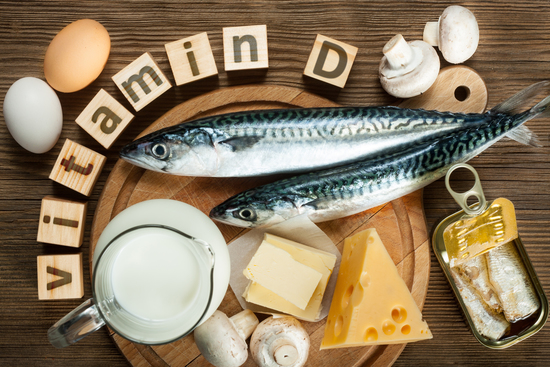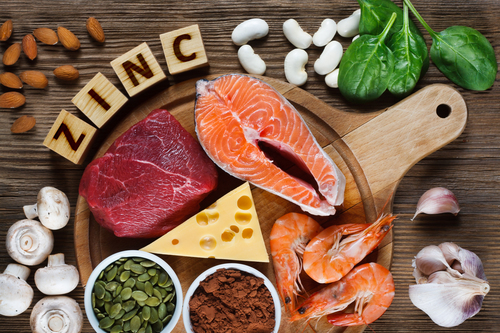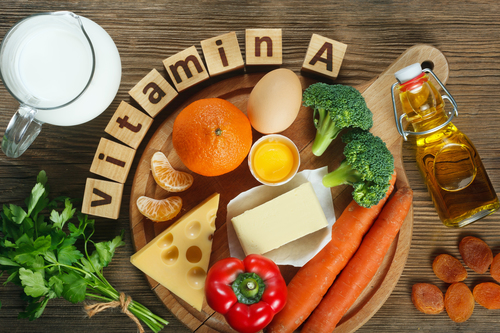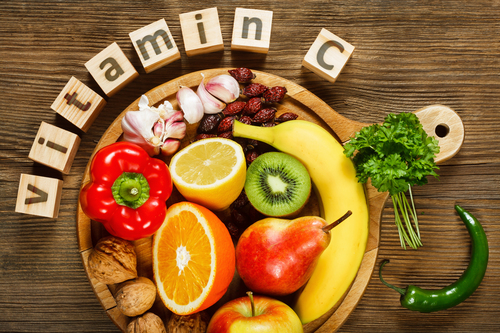

Good Food is the Best Medicine!

Spotlight on Vitamin D!
- Found in cells throughout the entire body
- Needed for health and to maintain strong bones (combined with calcium, it protects older adults from osteoporosis)
- Helps the body absorb calcium (main building block of bones)
- Deficiency could cause soft, thin, and brittle bones (known as Rickets in children and Osteomalacia in adults)
- Muscles need it for movement, which is triggered by nerve impulses between brain and every body part
- Immune system needs it to fight off invading bacteria and viruses
- Few foods are natural sources, so the major source in food is typically fortified
- Fatty fish such as salmon, tuna, and mackerel are among the best natural sources
- Beef liver, cheese, and egg yolks provide small amounts, naturally
- Mushrooms provide some vitamin D, but more are available due to growers exposing mushrooms to UV light to boost this nutrient
- Dairy milk, soy milks, almond milk, and oat milk are often fortified with Vitamin D, though products made from these milks typically are not
- The skin can make Vitamin D from direct exposure to the sun’s UV rays – windows and sunscreen interfere
- Supplements (high dose prescription or over-the-counter daily pills) are also available to increase body stores
Why is Vitamin D of concern? It is an essential nutrient needed to sustain human health. It is a steroid hormone with an important role in the metabolism of calcium and phosphorus. That is why deficiency can contribute to bone-related disorders. Recent studies have also found that Vitamin D is closely associated with cardiovascular diseases, diabetes, cancers, autoimmune diseases, infectious diseases, and neuropsychiatric disorders.
Neuropsychiatric disorders include a wide variety of conditions affecting the nervous system:
- Seizures
- Attention deficit disorders
- Cognitive deficit disorders
- Migraine headaches
- Addictions
- Eating disorders
- Anger control issues
- Depression
- Anxiety
For overall wellness, or to help manage a chronic condition, it is a good idea to have your physician check your Vitamin D levels and treat any deficiency. Having adequate levels of Vitamin D within your diet, safely exposing yourself to sun, and supplementation could help you feel your best.

Spotlight on Zinc!
- It is a micronutrient (mineral) that people need to stay healthy.
- It is found in cells throughout the entire body.
- It helps our immune system fight off invading bacteria and viruses.
- It is necessary for the body to make proteins and DNA.
- It is needed during pregnancy, infancy and childhood to ensure growth and development.
- It helps to heal wounds.
- It affects proper senses of taste and smell.
- A wide variety of foods contain zinc, so eating a varied diet is important.
- Contains SOME: Beans, nuts, whole grains, and dairy products
- GOOD Source: Red meat, poultry, seafood (esp. crab and lobster), and fortified breakfast cereals
- BEST Source: Oysters
- Avoid nasal sprays with zinc as it could permanently affect senses of taste and smell if overused.
- Throat lozenges with zinc are ok to use, as are multivitamins and supplements.
- Signs of too much zinc include nausea, vomiting, loss of appetite, stomach cramps, diarrhea and headaches.If too much zinc is taken for a long time, it can lead to problems such as low copper levels, lower immunity, and low levels of HDL "good" cholesterol.

Spotlight on Vitamin A!
- It is a fat-soluble vitamin (meaning it needs fat to help the body absorb it) stored in the liver.
- It is an essential micronutrient which the body cannot make, so we need to get it from our diet.
- It has an essential role in eye/vision health, body growth, immune function, and reproductive health.
- It is a key part of our immune system, stimulating production and activity of white blood cells.
- Deficiency causes increased chance of infections, hair loss, skin problems, and night blindness.
- There are 2 forms of Vitamin A we can get in our diet:
- Preformed (retinol)
- Pro-vitamin A carotenoids (alpha-carotene & beta-carotene which body turns into retinol).
- Retinol is found in:
- Animal-sourced foods (e.g. fish, liver, eggs, cheese, and butter)
- Fortified foods (e.g. cereals and milk)
- Supplements (NOTE: Upper limit to avoid toxicity is 3,000 iu)
- Carotenoids are found naturally in plant foods (e.g. fruits, vegetables, beans, and whole grains). Naturally RED and ORANGE foods are sources of beta-carotene!

Spotlight on Vitamin C!
- It is a water-soluble vitamin (so it will be absorbed without the need for fat, unlike Vitamin A) so there is no concern about toxicity.
- It is another essential micronutrient which the body cannot make and must be in our diet.
- It is an antioxidant that helps protect cells from damage caused by free radicals (both formed when the body converts food to energy and found in the environment).
- It also helps make collagen, which is needed for wound healing.
- It improves body’s ability to absorb iron from plant-sourced foods.
- It helps the immune system work to protect the body from disease.
- Deficiency can lead to bruising easily, gingivitis and bleeding gums, dry/splitting hair, dry/rough skin, lower wound-healing rate, and a decreased ability to prevent infection.
- Vitamin C can be lost with cooking, so steaming or microwaving are best methods.
- Vitamin C is found in:
- Citrus fruits and their juices
- Red and green pepper and kiwifruit
- Other fruits and vegetables (such as broccoli, strawberries, cantaloupe, baked potatoes, and tomatoes)
- Foods and beverages fortified vitamin C (check product labels to see if Vitamin C was added)






